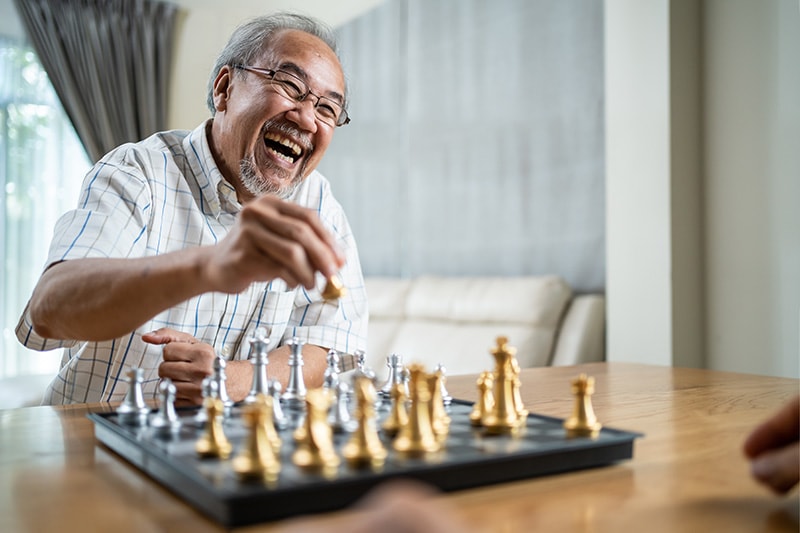Confident Aging
- Category: Individuals

“Older people—say in their seventies—walking at a brisk pace …will tend to look younger, healthier and more vigorous than those who are ambling. This impression is borne out by the science. The slowest walkers – particularly men – are almost twice as likely to die in the next few years compared to the fastest.
What’s more, when people slow down their walking pace significantly over a two-year period, their chances of dying in the next few years almost double”.

Excerpted from How Confidence Works: The New Science of Self-Belief, Why Some People Learn It and Others Don’t
© Ian Robertson, 2021, Bantam Press
With these jaw-dropping statistics, Robertson opens his research on confidence and aging. The study he reports considers walking more slowly because of illness, which is not nearly as important as “a loss of motivation and engagement with the world”.
“Researchers at Trinity College Dublin…studied how fast more than four thousand older people – with an average age in the early sixties—walked and how that changed over the following two years….[T]hey then studied how confident they [the walkers] felt about getting old at the beginning of those two years and discovered that people differ in their attitudes.
“The walking speed of those who felt least confident about growing old slowed down by 13 per cent more than those who felt most confident. Walking speed predicts future health, and the researchers could rule out other plausible reasons for this link between aging-confidence and walking speed.
“In these same people the researchers found a similar link between aging-confidence and changes in cognitive ability. The least confident showed a much steeper drop in their mental sharpness over two years compared to the most. Also, they showed a much more precipitous decline in their self-reported day-to-day memory.”
“How good you think your memory is – subjective memory assessment – is a topic of great interest to dementia researchers. Your belief in yourself matters. Almost everyone notices changes in their memory as they get older,…But a five-year study of around two thousand over sixty-five-year-olds in Pennsylvania makes this confidence-memory link particularly interesting. The research showed subjective beliefs about memory appeared before changes in objective memory did.
“Confidence can embed itself in your brain and in your body—and, perhaps, lengthen your life. Research on seventy thousand nurses in the U.S. found that women who were the most optimistic earlier in their lives lived an average of fifteen years longer than the least optimistic.
“The desire to make choices, and so to feel in control of our lives, is hard-wired into our brains. That is why exercising control switches on the same dopamine-linked reward network as happiness does…….”dopamine-driven pleasurable activity dramatically reduces the amount of the stress hormone cortisol that your body makes….This is true not just for minutes or hours, but for days, months and years.”
Happy, confident people who feel they have control over their lives take more investment risks University of Illinois investigators discovered, and your happiness predicts your personal wealth independently of your socioeconomic status.
“Across the globe, the confident feeling of having some control over your life predicts your life satisfaction better than your health, work, wealth, marital status or religion….A sense of control could indeed break the malign grip that poverty can have on mental wellbeing.”
“Most of us have brains that are much more responsive to good news than bad. The more biased we are towards the positive, the stronger the connections between the frontal part of the brain and the emotion centers, such as the amygdala and insula. Optimists…have thicker ‘cabling’ connecting the good-news and emotion centers of the brain”. This means the fight-flight-freeze response which promotes anxiety is less impactful.
“How people respond to good news doesn’t change much over the course of their lifetime. But the story for bad news is very different. Our brains react to negative news most around the age of forty …But then it falls off steadily through our sixties and seventies until it reaches a level in eighty-year-olds far below that seen in children.
“Confidence also helps us with its pharmacological anti-depressant effects. Its energizing ability to make us do stuff helps to unfurl new opportunities that we wouldn’t have encountered without it. And because confidence helps us to enact in our minds outcomes that we want, that mental simulation makes it more likely that they will happen. It makes our bodies more robust and the effort less painful.”
“The feeling of having got through – mastered – painful or difficult experiences swells self-belief like little else…[S]uper-elite performers …have already learned that, while they are painful and unpleasant, they are also temporary, controllable, and not central to who they are.”
“Confidence is a distorting lens that makes us optimistic in the face of contrary evidence. It is not only words, but also a mild delusion without which we wouldn’t have reached the moon, created the internet, or eliminated smallpox”.
Robertson summarizes his first few chapters with what works to build confidence, from “superficial (just saying [positive] words to the more profound (thought confidence)”. He supports “the rose-tinted glasses that are a vital delusion for confidence…to help us get out of bed in the morning—to defy brute probabilities, and to create new ones.”
Getting centered in your natural, brain-based strengths can provide a sense of control, confidence, and purpose in your life’s work. You’ll know what you can contribute, where you need to collaborate, and what kind of help you can ask for and from whom.

